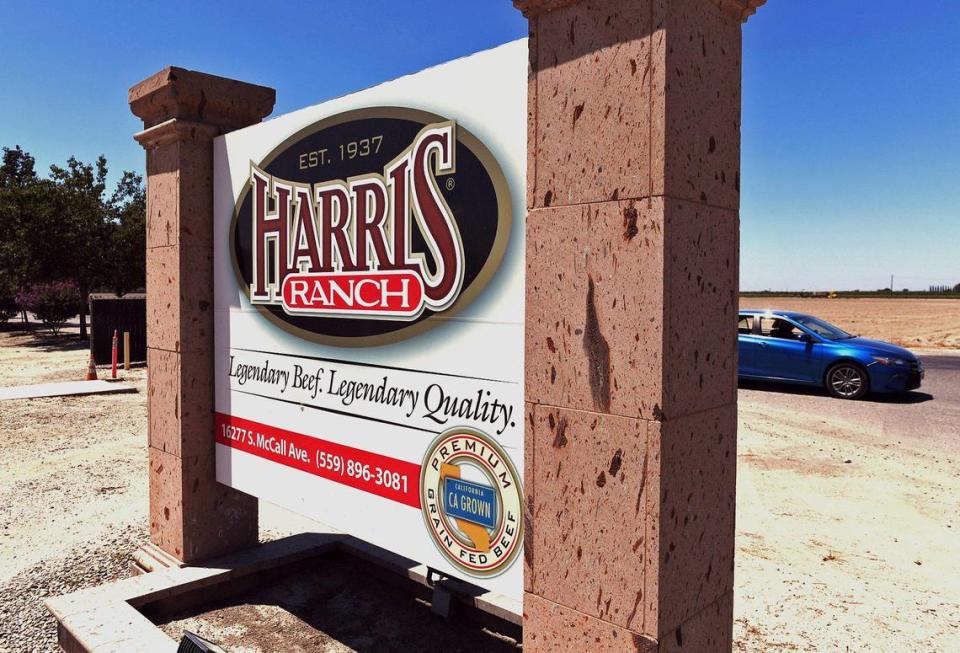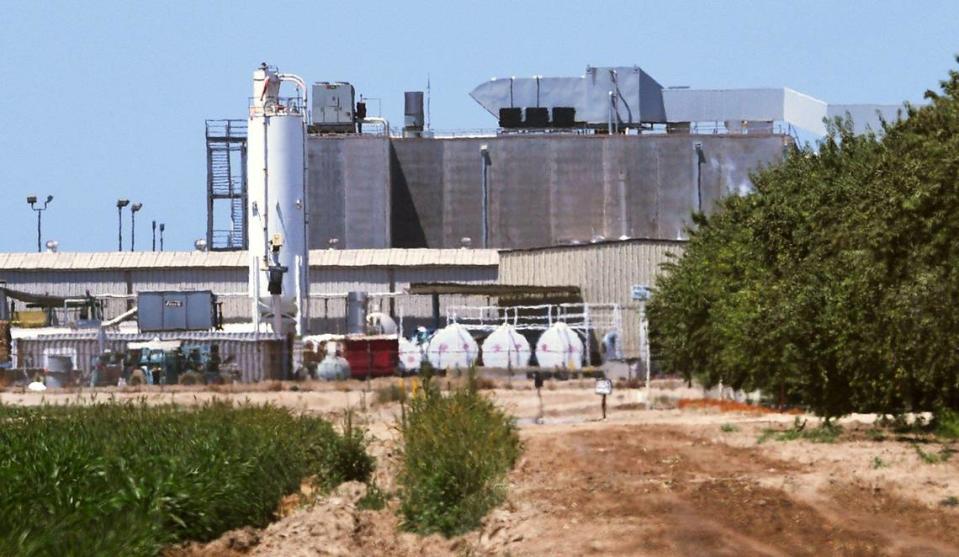Coronavirus outbreak at California beef company has critics calling for more transparency
In California, there are no clear, enforceable rules for private companies — or public health officials — to report COVID-19 outbreaks at workplaces.
That’s a potentially life-threatening problem for vulnerable essential workers, advocates told The Fresno Bee.
An example of the issue is playing out in the small town of Selma, where five employees told The Bee that up to half of the workers at Harris Ranch Beef Company had missed work due to COVID-19 concerns. That’s more than 100 workers.
All five employees spoke to The Bee on condition of anonymity because they feared possible repercussions from their employer.
Harris Ranch Human Resources Vice President Mike Casey declined to disclose the total number of COVID-19 cases or the total number of people absent due to fear or possible COVID-19 infections.
While the state and county have issued safety guidelines for employers to keep workers safe during COVID-19, critics say the rules lack teeth. So the health of essential workers, who often can’t afford to miss work, falls in the hands of their employers, according to Sandra Celedon, president of Fresno Building Healthy Communities.
Her organization has received about 10 calls each week from worried essential workers in different fields who were told they might have been exposed to the virus on the job, but had to keep showing up to work, Celedon said.
“Time and time again, blue-collar workers have to choose between their health and their income,” she said. “This has been the mode of operation for as long as I can remember in the Central Valley. COVID-19 is exacerbating that reality.”

COVID-19: Reporting inconsistencies
Policies on reporting COVID-19 infections and outbreaks in California vary between companies —and county health departments.
The Tulare County Health Department makes public any workplace with over 11 cases, according to Public Information Officer Carrie Monteiro. Tulare health officials confirmed 21 Tulare County residents who work at Harris Ranch tested positive.
But Fresno County, where Harris Ranch is located, doesn’t release workplace-related infection numbers.
“While we’re not ready to publicize workplace-related outbreaks in the same way that other counties are doing just yet, we are looking at how we can be a little bit more sensitive to some of the requests that we’re getting from the public,” said Dr. Rais Vohra, Fresno County’s interim health director.
He said employers are not mandated to report cases to their employees, and employees don’t have to report their medical conditions to their employers. The county nevertheless makes it a priority to follow up with anyone who tests positive and all of their close contacts as soon as possible, Vohra said.
Without clear rules, it falls on employers to decide how much to disclose, and what to do about it.
Some companies, like Amazon, have informed employees of each new COVID-19 case through an app, without disclosing total illnesses. Others, like coffee chain Dutch Bros, have decided to close up shop after a single COVID-19 infection.
Coronavirus outbreak reported at Foster Farms’ Livingston complex
The Fresno County Sheriff’s Office has released a steady case count at the county jail, which now has over 600 infections.
Celedon said the lack of transparency hurts workers.
“The public has a right to know where are the locations, the businesses where clusters are happening because that’s the only way we’ll be able to intervene in this disease that is absolutely killing people,” she said. “People are literally dying in their community, and instead of protecting their lives, we’re protecting employers who are ignoring people’s right to live.”
Harris Ranch coronavirus outbreak
Casey, from Harris Ranch, said the company had implemented all CDC health and safety guidelines for meat processing facilities.
“We believe that with the multitude of safety measures and precautions that have been put in place, the work environment provides a safer environment than the general community setting,” he said in an email statement to The Bee.
But in many departments, employees work shoulder to shoulder and wearing masks is not enforced, two workers said. With a large chunk of workers out, those still working are forced to pick up the slack, the employees added.
“People don’t know what’s going on because there’s no meetings, nothing,” said one worker who tested negative for COVID-19. “There’s basically a bunch of chickens walking around with their heads cut off.”
Three workers who were sent home with COVID-19 told The Bee they have struggled to get paid the 80 hours of federally mandated sick leave.

Casey, from Harris Ranch, said eight people staff the office. If an employee is eligible for pay and has not received it, he told The Bee he would take care of it.
The three workers were also told to go back to work after 14 days at home, they said. They worry about bringing the virus back into the workplace.
Casey said no one was being told to disregard their health providers’ orders. Instead, he said there had been inconsistency in how healthcare providers handle and direct patients who have been tested or await test results.
“We can assure you that no employees are being permitted back into the workforce if they are symptomatic or have an active positive test,“ he added.
The county can step in and force compliance if the company holds a permit with the county, according to Fresno County Public Health Director David Pomaville.
But he said the county has seen “really remarkable compliance from larger employers, the packing industry, the meat processing industry and so forth. They are working very hard to try to make sure that their employees are being healthy. There’s been a few that we’ve had to use a more aggressive approach with, but overall we’ve gotten really good voluntary compliance.”
Staying in business vs worker health during pandemic
Fresno-based medical anthropologist Dvera Saxton said there is no incentive for employees or employers to take care of people. She suggested a quarantine fund that would provide a financial incentive for sick or exposed workers to stay home.
“There’s already a worker shortage, even though there’s a lot of unemployment, so there’s fear around not having enough workers to not manage things,” she said. “But that should be an incentive to curb the spread, to support people who get sick so they can recover and eventually go back to work.”
While programs like family sick leave and workers’ compensation help, she said employers had a history of trying to negate those cases or draw them out so that employees give up. The process of calling the Occupational Safety and Health Administration as a worker, she added, “is really cumbersome and challenging.”
One of the Harris Ranch workers who was infected told The Bee she had filed a complaint about the outbreak with Cal-OSHA but was told they needed more complainants to open an investigation.
Cal-OSHA Public Information Officer Frank Polizzi did not respond to specific questions related to Harris Ranch. However, he did say the agency is responding to worker complaints “by actively engaging with employers via phone and letter until they confirm they have corrected hazards and implemented COVID-19 precautions.”
Cal-OSHA conducts inspections for the most serious allegations of COVID-19 workplace hazards, he added.
Celedon, from Fresno Building Healthy Communities, laments government agencies’ inability to take more vigorous action, which she believes stems from a long-standing lack of funding.
“So I do think it’s more about the lack of investment in our public health system and the lack of support from elected officials to really structure our public health department to one that has the ability to enforce public health orders,” she said.
Saxton agrees. She believes Fresno County could have reduced the high rates of sexually transmitted illnesses, drug addiction, and homelessness with more investment in preventive measures. She thinks the county is making the same mistake with COVID-19.
“And we seem to make the same mistakes over and over and over again,” Saxton said. “Maybe it’s better to invest in people while they’re still alive.”
Manuela Tobias is a reporter with The Fresno Bee. This article is part of The California Divide, a collaboration among newsrooms examining income inequity and economic survival in California.

